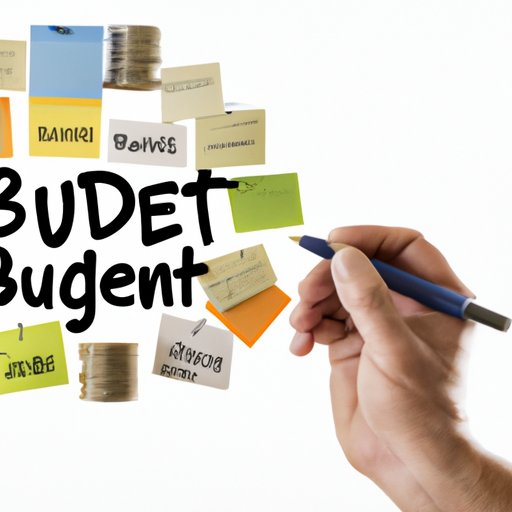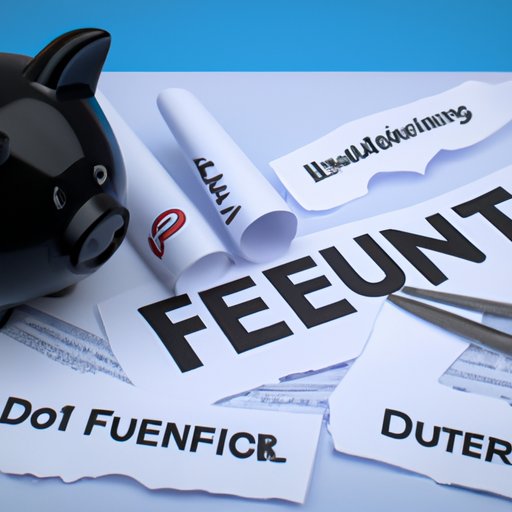Introduction
Financial problems can be a source of stress for many people. A financial problem is defined as any issue that has to do with money, such as having too much debt, not being able to pay bills, or struggling to make ends meet. Fortunately, there are steps you can take to help with your financial problems and get your finances back on track.

Develop a budget and stick to it
Having a budget is one of the best ways to stay on top of your finances and manage your money. A budget helps you understand where your money is going, enables you to set financial goals, and allows you to prioritize spending. Creating a budget doesn’t have to be complicated; all you need is a pen, paper, and a few hours of your time.
To create a budget, start by writing down all of your sources of income, followed by all of your expenses. This includes both fixed expenses (like rent and car payments) and variable expenses (like groceries and entertainment). Once you’ve written down all of your expenses, subtract them from your income. The amount left over should be your monthly savings goal.
Sticking to a budget can be difficult, especially if you’re used to living without one. Here are a few tips that can help:
- Set realistic financial goals that are achievable in the short-term.
- Track your spending daily, weekly, or monthly.
- Avoid impulse purchases and wait 24 hours before making a big purchase.
- Reward yourself for sticking to your budget.
Cut back on unnecessary expenses
Another way to help with financial problems is to identify and cut back on unnecessary expenses. These are expenses that you don’t really need or that could be reduced. Examples of unnecessary expenses include eating out, buying expensive clothes, and subscribing to services you don’t use. Cutting back on these expenses can help you save more money and reduce financial stress.
To identify and reduce unnecessary expenses, start by tracking your spending for a month. This will help you see where your money is going and what areas you can cut back on. Then, create a list of non-essential expenses and decide which ones you can eliminate or reduce. Finally, look for ways to save money in other areas, such as switching to a cheaper phone plan or finding a lower-cost gym membership.
Utilize free financial resources
There are many free financial resources available online that can help you better manage your money. These resources can provide information on budgeting, saving, investing, and more. Some examples of free financial resources include websites like Mint, NerdWallet, and Personal Capital, as well as government resources like the IRS website.
Using free financial resources can help you learn more about money management, identify potential savings opportunities, and track your progress towards your financial goals. It also gives you access to tools and calculators that can help you make smarter decisions about your money.
Create an emergency fund
An emergency fund is an important part of any financial plan. An emergency fund is a collection of money set aside for unexpected expenses, such as medical bills, home repairs, or job loss. Having an emergency fund can help you avoid taking on more debt and give you peace of mind knowing that you have money saved up for a rainy day.
To create an emergency fund, start by setting a goal for how much you want to save. Aim to save at least three to six months’ worth of living expenses. Next, open a separate savings account specifically for your emergency fund and set up automatic transfers to add money to it each month. Finally, resist the urge to spend the money in your emergency fund, unless it’s absolutely necessary.

Consider debt consolidation or refinancing
If you have a lot of debt and are struggling to keep up with payments, debt consolidation or refinancing may be an option. Debt consolidation is when you take out a loan to pay off multiple debts, such as credit cards, student loans, or medical bills. Refinancing is when you take out a new loan to pay off an existing loan, often with a lower interest rate.
Debt consolidation and refinancing can help you pay off your debt faster and save money on interest. However, it’s important to understand the terms of the loan and make sure you can afford the monthly payments.
Conclusion
Financial problems can be stressful, but they don’t have to be overwhelming. There are steps you can take to help with your financial problems, such as developing a budget and sticking to it, cutting back on unnecessary expenses, utilizing free financial resources, creating an emergency fund, and considering debt consolidation or refinancing. Taking action now can help you get your finances back on track and reduce financial stress.
(Note: Is this article not meeting your expectations? Do you have knowledge or insights to share? Unlock new opportunities and expand your reach by joining our authors team. Click Registration to join us and share your expertise with our readers.)
